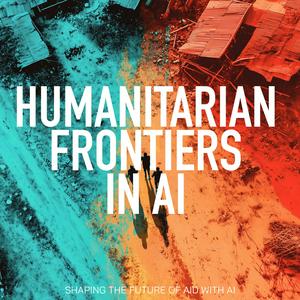Nowhere To Go but Up: Future Trends of AI Use in the Humanitarian Sector
As the humanitarian sector navigates significant transformation, AI is emerging as an essential tool, but how do we ensure it is used effectively, ethically, and at scale? In this episode of Humanitarian Frontiers in AI, we welcome Nana Gamkrelidze, Planning, Monitoring, Evaluation, and Reporting Delegate at the International Federation of Red Cross and Red Crescent Societies (IFRC), and Karin Maasel, CEO at Data Friendly Space and Board Chair at H2H Network, to discuss the latest AI trends in humanitarian work, the challenges of adoption, and the evolving role of technology in crisis response. In our conversation, we delve into how Europe has positioned itself as a regulatory and innovation leader, why AI adoption in humanitarian organizations is vital, and how humanitarian efforts should change to leverage AI technology effectively. Explore how funding cuts have sparked the adoption of AI, what humanitarian organizations can gain from data analytics, and how the cost of building AI for humanitarian efforts has changed. We also uncover the common barriers to AI adoption, the benefits of multi-modal AI approaches for situational awareness, data protection policies, ethical concerns, and the power of AI agents. Join us to discover how AI is reshaping the humanitarian sector, the key to its successful integration, and how to navigate the ethical and operational challenges ahead. Tune in now!Key Points From This Episode:Introduction and a warm welcome to Karin Maasel and Nana Gamkrelidze.Main takeaways from the recent AI Action Summit in Paris.Trends in AI humanitarian efforts between the Global North and Global South. Learn about the impact of global funding cuts on humanitarian efforts. Ways AI can help shift away from reactional responses by leveraging data analytics.Why humanitarian organizations need to embrace AI and data analytics.Find out what is preventing humanitarian organizations from implementing AI. How multi-modal AI approaches can help organizations address inefficiencies. Unpack the ethical concerns and risks surrounding AI in humanitarian work.Explore the pros and cons of open-source AI versus public-private partnerships.How AI agents could improve processes, reduce silos, and automate data collection.Uncover long-term adoption strategies and the future of AI in the humanitarian sector.Links Mentioned in Today’s Episode:Karin Maasel on LinkedInData Friendly Space (DFS)H2H NetworkNana Gamkrelidze on LinkedInInternational Federation of Red Cross and Red Crescent Societies (IFRC)AI Action SummitUN World Food Programme (WFP)GANNETHugging FaceNasim Motalebi Nasim Motalebi on LinkedIn Chris Hoffman on LinkedInHumanity LinkChris Hoffman

